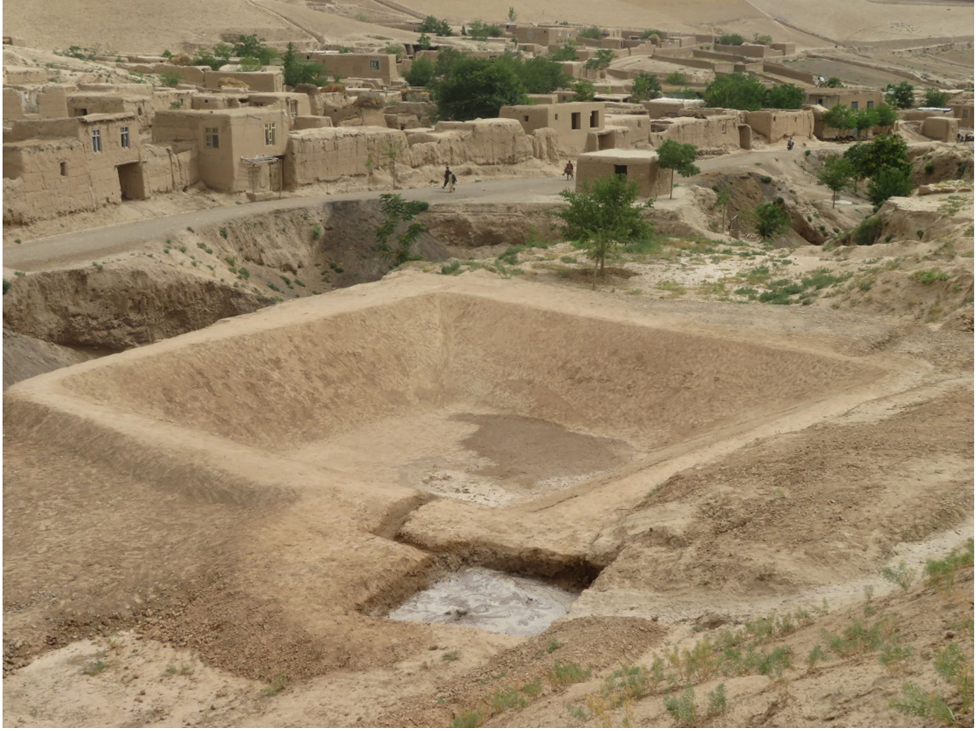Increasing access to water to support recovery from the pandemic

“After the construction of water ponds in our village, I can collect water for my sheep within five minutes and feel comfortable and safe.” – Aalem Qurban*, a local shepherd
In Afghanistan, decades of war, recurring climate-induced disasters, chronic poverty, severe drought, widespread food insecurity and economic instability – exacerbated by the COVID-19 pandemic – have resulted in one of the world’s largest and most complex humanitarian emergencies. In 2023, two-thirds of the country’s population will need humanitarian assistance.
To make matters worse, several years of drought-like conditions in Afghanistan have complicated water access in communities, resulting in consistently low crop yields and forcing people to travel for hours to get water. A national drought was officially declared in June 2021 and is the worst in more than 30 years.
In 2022, the Center for Disaster Philanthropy awarded Concern Worldwide a grant from the COVID-19 Response Fund to help communities in Afghanistan withstand the ongoing effects of the pandemic and recover from the economic impacts by increasing access to water back to pre-pandemic levels. Lack of adequate access to water increases COVID-19 risk because it affects health and hygiene. It also affects livelihood opportunities and household income, which have been worsened by the pandemic.
Faraz Khada* is a father of 10 children and has been a farmer since his youth. In recent years, Faraz struggled to afford his family’s basic needs due to consistently low crop yields brought on by drought.
"I have three-acre agricultural land and grow onion, wheat and vegetable, but due to lack of water, my crops decreased, and I was not able to afford my family's needs." - Faraz Khada
With support from CDP, Concern Afghanistan implemented the “Increasing Access to Water to Mitigate Against COVID-19 and Restore Pandemic-Affected Livelihoods” project to improve access to water in communities in Afghanistan’s northeast region, which are among the worst affected by the nationwide drought.
The project included two main activities. First, Concern worked with communities to clean silt from 39.69 miles (63.88 kilometers) of the Shahrawan canal, which provides water to irrigate land across three districts: Taloqan, Baharak, and Khoja Ghar.
By desilting and cleaning the canal, water flow was unobstructed, returning available water to pre-COVID levels and mitigating the effects of water scarcity for the 200,000 community members. Water is now readily available to meet various essential needs, from horticulture to laundering clothing to construction. In total, 80% of farmers along the Shahrawan canal reported improved access to irrigation water in the three months following the intervention.
The second activity involved the construction of 30 water storage ponds, like the one featured in the photo above. Community members participating in cash-for-work programs built the multipurpose rainwater ponds. The ponds were designed in consultation with community members and dug into the side of the mountains in areas prone to floods during the rainy seasons. The ponds can break the flow of floodwater and provide a safe space for the water to pool without destroying farms or houses while simultaneously providing longer-term water storage for communities, a dual disaster-proofing feature.
In Shor Qudoq village, shepherds previously had to travel by donkey across rough and challenging terrain for five hours to collect water for their sheep and often faced security issues. After the completion of the project, a local shepherd, Aalem Qurban*, noted, “After the construction of water ponds in our village, I can collect water for my sheep within five minutes and feel comfortable and safe.”
The “Increasing Access to Water to Mitigate Against COVID-19 and Restore Pandemic-Affected Livelihoods” project allowed Concern to inject desperately-needed cash into communities through the cash-for-work programs. This provided timely relief for families and improved food security, with 97% of households using the cash assistance to purchase food, while project activities to create longer-term solutions to increase water access and improve livelihoods were underway.
Overall, the project employed 1,025 individuals. As a result, 1,006 of the most vulnerable households (estimated 7,042 individuals, based on the average of seven members per household) directly benefited from the project, while the broader community benefited from the improved assets created. In total, the project served an estimated 202,800 individuals.
CDP is proud to support Concern Worldwide’s efforts to improve water access to help communities in Afghanistan recover from the adverse economic impacts of COVID-19 and the ongoing drought.
*Names changed for security reasons.
Story by Ruja Entcheva